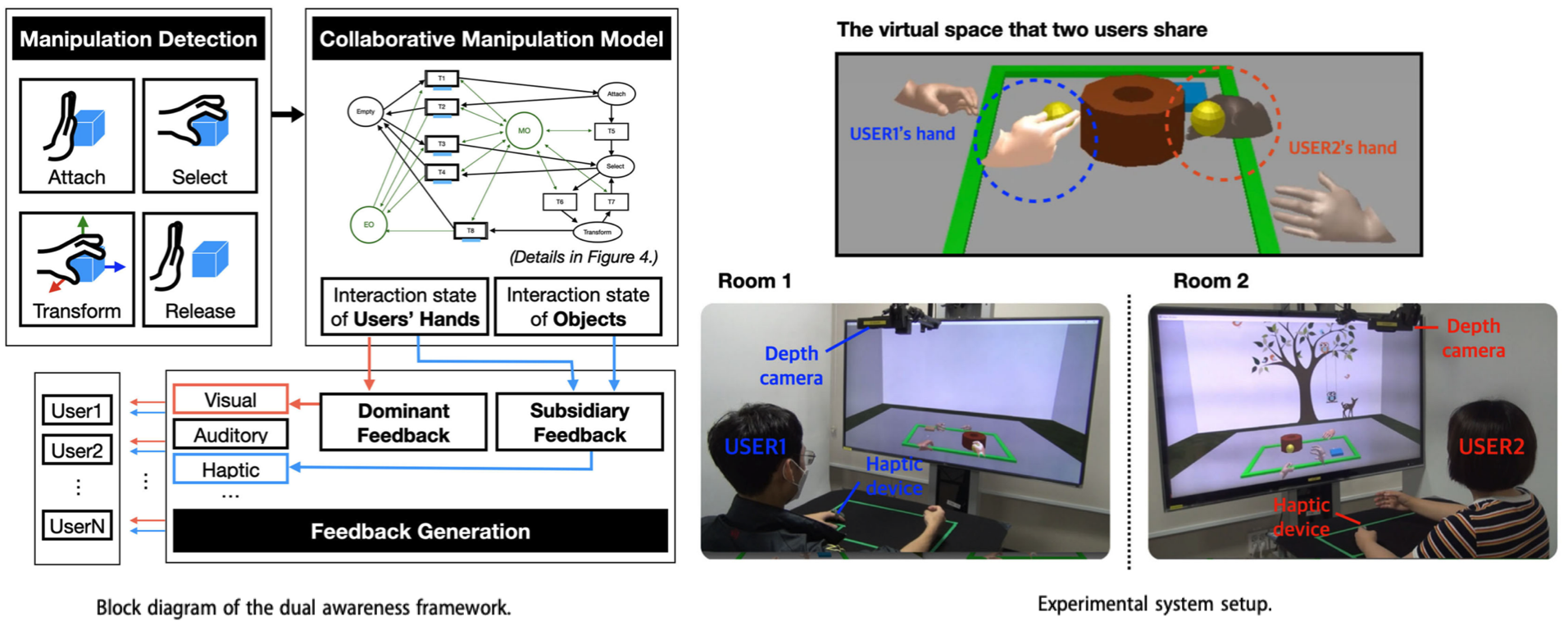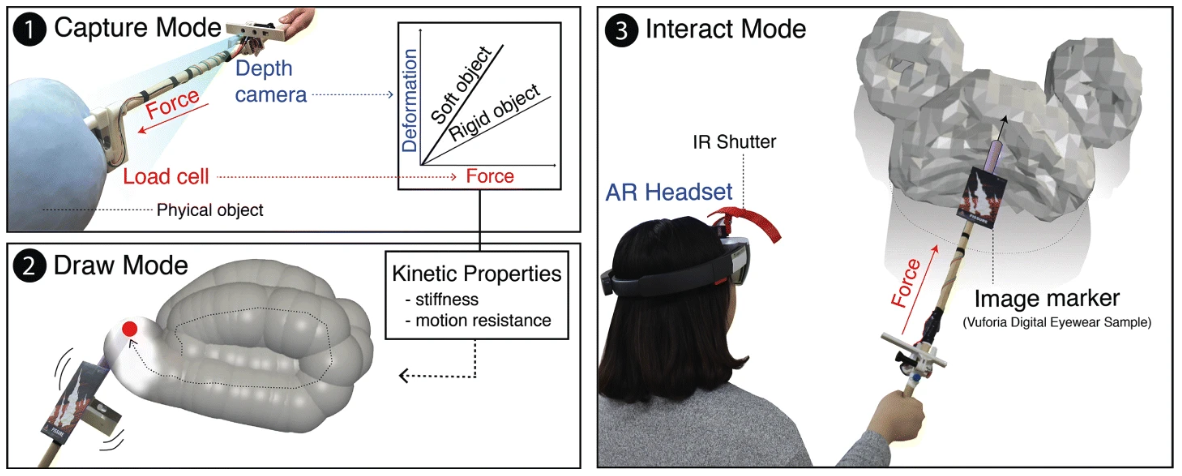About me
Hello! 🌼 I am a Ph.D. student in Information Science at Cornell University, advised by François Guimbretière. My research aims to design collaboration tools that support digital-physical convergence.
I believe advanced spatial convergence will be pervasive in various contexts, such as hybrid meetings, ubiquitous environments, or human-robot collaboration. Through designing tools for supporting this convergence, I would like to understand socio-spatial interactions between humans. Therefore, I would like to not only build collaboration tools but also conduct empirical studies to understand human interactions.
Prior to joining Cornell, I worked as a Research Assistant at the AI & Robot Institute at KIST (Korea Institute of Science and Technology). I earned my Master's degree in Culture Technology from KAIST in 2019, and my Bachelor's degree in Electrical Engineering from Ewha Womans University in 2017.
Beyond my studies, I love exploring new destinations 🧳, trying out new activities 🚀, and adding to my collection of badges & postcards 💌! I'm always on the lookout for my next thrilling journey.
Publications
-
VRoxy: Enabling Remote Collaboration in Large Spaces Beyond Local Boundaries via a VR-Driven Robotic Proxy
Mose Sakashita, Hyunju Kim, Brandon J Woodard, Ruidong Zhang, François Guimbretière
Proceedings of the 36th Annual ACM Symposium on User Interface Software and Technology, 2023. Download
-
Providing Dual Awareness using Multimodal Cues for Collaborative Manipulation in Virtual Environments
Hyunju Kim and Jung-Min Park
International Journal of Human–Computer Interaction, 2023, 1-15. Download
-
Comparing the Impact of Professional and Automatic Closed Captions on Video-Watching Experience
Hyunju Kim, Yan Tao, Chuanrui Liu, Yuzhuo Zhang, Yuxin Li
Extended Abstracts of the 2023 CHI Conference on Human Factors in Computing Systems, 2023. Download
-
ReMotion: Supporting Remote Collaboration in Open Space with Automatic Robotic Embodiment
Mose Sakashita, Ruidong Zhang, Xiaoyi Li, Hyunju Kim, Michael Russo, Cheng Zhang, Malte F. Jung, François Guimbretière
Proceedings of the 2023 CHI Conference on Human Factors in Computing Systems. 2023. p. 1-14. Download
-
Human-Centered Dynamic Service Scheduling Approach in Multi-Agent Environments
Yunseo Jung, Hyunju Kim, Kyung-Duk Suh, Jung-Min Park
Applied Sciences, 2022, 12.21: 10850. Download
-
RealityBrush: an AR authoring system that captures and utilizes kinetic properties of everyday objects
Hyunju Kim, Sanghwa Hong, Junki Kim, Taesoo Jang, Woontaek Woo, Seongkook Heo, Byungjoo Lee
Multimedia Tools and Applications, 2021, 80: 31135-31158. Download
-
Button++ Designing Risk-aware Smart Buttons
Eunji Park, Hyunju Kim, Byungjoo Lee
Extended Abstracts of the 2018 CHI Conference on Human Factors in Computing Systems, 2018, p.1-6. Download
-
A Study on the Effect of Inter Key Spacing on Typing Performance
Hyunju Kim, Eunji Park, Byungjoo Lee
HCI Korea, 2018, pp.394-398. Download
Projects
-
Exploring the Influence of Representation in Asymmetric Telepresence System
In-Progress
Remote collaboration techniques often involve immersive methods for some collaborators, while others employ robotic surrogates to engage with remote counterparts. The choice between a physical robot and a virtual avatar as a representation raises questions about the balance between realism and flexibility. This study investigates which representation, whether a physical robot or a virtual avatar, is more effective for local collaborators, particularly in terms of their perception of remote users. It also explores how these representations impact copresence, specifically regarding peripheral awareness and understanding of the dynamics in remote collaboration.
-
Extended Reflection: Enhancing Teachers’ Reflective Practices through XR
In-Progress

This study examines the use of Extended Reality (XR) as a tool to enhance teachers' self-reflection on their nonverbal instructional techniques. Through experimentation with ten teachers using two XR prototypes, Immersive XR and VR Desktop, participants reviewed their previous teaching sessions to assess their interactions with students of varying engagement levels.
-
XR as Remote Demonstration Methodology for Hardware Prototyping: A Reflexive Approach
In-Progress
This paper advocates for the adoption of extended reality (XR) as a remote demonstration method for evaluating human-computer interaction (HCI) prototypes. By utilizing XR, researchers can broaden the audience and accessibility of their demonstrations without compromising the essence of the user experience. Drawing on ethnographic reflexivity, the paper introduces three key functionalities of remote XR demonstrations. This proposal underscores the efficacy of reflexive demonstrations and enriches the repertoire of remote HCI evaluation techniques.
-
Remote Table Sharing: Enhancing Cultural Culinary Experiences through Digital Windows
Proposal
-
VRoxy: Enabling Remote Collaboration in Large Spaces Beyond Local Boundaries via a VR-Driven Robotic Proxy
UIST 2023

VRoxy is a novel system that allows remote collaboration through a telepresence robot using a VR headset in confined spaces like personal offices. The system translates small VR movements into larger robot movements, facilitating easy navigation in large physical spaces. Real-time interactions are supported by a 360 camera feed upon the robot's arrival. VRoxy incorporates various interaction modalities, enabling the mapping of multiple physical locations into a unified virtual space. In a study, users successfully completed a design task in a 7.5m x 5m layout using a 3m x 2m VR space, showcasing the system's efficacy in remote collaboration.
-
Providing Dual Awareness using Multimodal Cues for Collaborative Manipulation in Virtual Environments
International Journal of Human–Computer Interaction

Effective virtual reality (VR) collaborative manipulation requires a profound understanding of users' self-awareness, awareness of collaborators, and awareness of shared objects within the virtual environment. This study introduces a novel framework for dual awareness, which comprehensively oversees the interactions among multiple users and shared virtual objects. The framework incorporates distinct sensory cues to differentiate users from their collaborators. The experimental results showed that participants could easily and quickly collaborate on manipulation using our feedback, and they also answered positively in the subjective evaluation.
-
RealityBrush: an AR authoring system that captures and utilizes kinetic properties of everyday objects
Multimedia Tools and Applications

This study introduces RealityBrush, an innovative augmented reality (AR) authoring system designed for rapid and facile creation of realistic virtual objects in the early stages of design. Comprising a handheld device, a data analysis module, and an AR feedback module, RealityBrush utilizes the kinetic properties of everyday physical objects. Through user interaction, wherein the device is used to poke a physical object, local force and resulting deformations are simultaneously measured. The system analyzes the relationship between force and deformations to identify two kinetic properties of the object: stiffness and motion resistance. Subsequently, users employ the handheld device as a 3D brush to craft virtual objects in the air, assigning the measured kinetic properties to the created virtual entities. Technical evaluation demonstrates the system's successful extraction of stiffness and motion resistance from everyday objects. Initial user feedback on AR authoring using RealityBrush is also reported, providing insights into the system's practical application and usability. This research contributes to the advancement of AR authoring tools for early-stage design processes.
Teaching Experience
Teaching Assistant at Cornell
Teaching Assistant at KAIST

hyunjukim@infosci.cornell.edu
Ph.D. in Information Science
Cornell University @Ithaca, NY